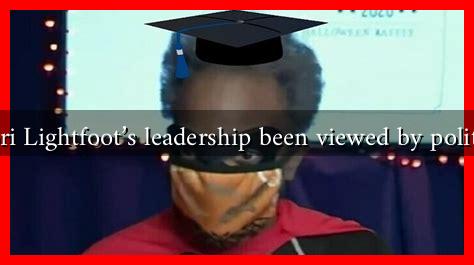-
Table of Contents
How Has Lori Lightfoot’s Leadership Been Viewed by Political Analysts?
Lori Lightfoot, the 56th mayor of Chicago, made history as the first African American woman and openly gay person to hold the office. Since her election in 2019, her leadership has been a subject of intense scrutiny and debate among political analysts. This article explores various dimensions of her leadership, including her handling of crime, education, and the COVID-19 pandemic, while also examining the broader implications of her policies on the city of Chicago.
Crime and Public Safety: A Double-Edged Sword
One of the most pressing issues during Lightfoot’s tenure has been crime. Chicago has long struggled with high rates of gun violence, and Lightfoot’s approach has drawn mixed reviews from political analysts.
- Increased Police Funding: Lightfoot proposed increased funding for the Chicago Police Department, arguing that more resources were necessary to combat rising crime rates. However, this move faced backlash from community activists and some analysts who argued that it perpetuated a cycle of violence and did not address the root causes of crime.
- Community Engagement: Lightfoot has emphasized community policing and engagement as a strategy to build trust between law enforcement and residents.
. Analysts have noted that while this approach is commendable, its effectiveness has been limited by ongoing tensions and distrust in certain neighborhoods.
- Statistics: According to the Chicago Police Department, homicides increased by 50% in 2020 compared to the previous year, raising questions about the efficacy of Lightfoot’s strategies.
Education: Navigating a Complex Landscape
Education has been another critical area of focus for Lightfoot. Her leadership during the COVID-19 pandemic, particularly regarding school closures and reopening, has been a contentious issue.
- School Closures: Lightfoot faced significant criticism for her handling of school closures during the pandemic. Many analysts argue that her decisions disproportionately affected low-income students who lacked access to resources for remote learning.
- Reopening Plans: The mayor’s plans for reopening schools were met with resistance from teachers’ unions, leading to strikes and protests. Analysts have pointed out that her inability to effectively negotiate with these unions has hampered her educational agenda.
- Long-term Impact: A report from the Chicago Public Schools indicated that students experienced significant learning loss during the pandemic, raising concerns about the long-term implications of Lightfoot’s policies on education.
COVID-19 Response: A Balancing Act
The COVID-19 pandemic presented unprecedented challenges for city leaders, and Lightfoot’s response has been both praised and criticized.
- Public Health Measures: Lightfoot implemented strict public health measures early in the pandemic, which some analysts credit with saving lives. However, others argue that these measures disproportionately impacted small businesses and marginalized communities.
- Vaccine Distribution: The mayor’s administration faced challenges in vaccine distribution, with disparities in access for communities of color. Analysts have noted that while Lightfoot’s team worked to address these issues, the initial rollout was marred by confusion and inequity.
Public Perception and Future Prospects
Lightfoot’s leadership has been polarizing, with public opinion reflecting a divide among Chicagoans. A recent poll indicated that her approval ratings have fluctuated significantly, often correlating with her handling of key issues like crime and education.
- Supporters: Many supporters argue that Lightfoot is a trailblazer who is unafraid to tackle difficult issues head-on. They appreciate her commitment to equity and community engagement.
- Critics: Conversely, critics contend that her leadership style is often combative and dismissive of dissenting voices, which has alienated some constituents and stakeholders.
Conclusion: A Complex Legacy
Lori Lightfoot’s leadership has been characterized by significant challenges and achievements. Political analysts view her tenure as a complex interplay of progressive ideals and practical governance. While she has made strides in certain areas, her administration has also faced substantial criticism, particularly regarding crime, education, and public health. As Chicago moves forward, the effectiveness of Lightfoot’s policies will continue to be a focal point for analysts and citizens alike, shaping the city’s future in profound ways.
For further insights into Lori Lightfoot’s leadership and its implications for Chicago, you can explore resources from the Chicago Tribune and Chicago Reporter.





